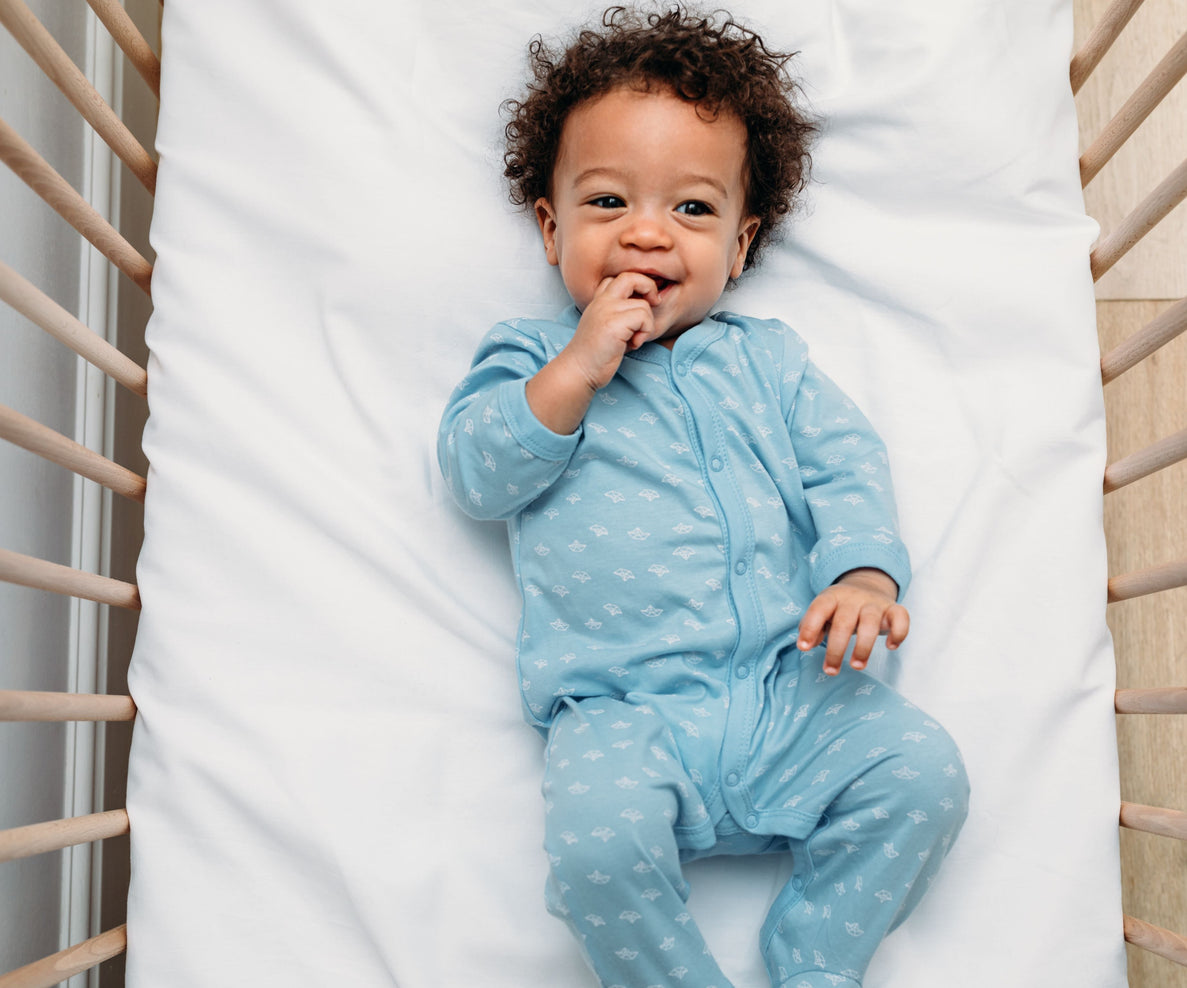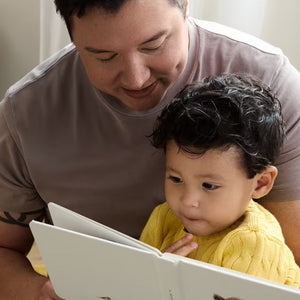Your eighteen month old is well into the toddler stage now! They are learning so much about their ability to impact the world and discovering that their actions cause reactions. They have power! When your little one realizes that power can also be used in combination with sleep, you may see some sleep struggles. Perhaps your 18 month old is waking at night, fighting naps, or throwing tantrums at bedtime. Let’s talk about setting your little one up for sleep success at this age!
18 Month Sleep Schedule Guidelines
Every little one is unique and your toddler’s day will depend on when they wake, how long they nap, and individual cues. Try aiming for these age-appropriate guidelines. These are not intended to be a rigid schedule, simply a guide for setting up a flexible routine.

Text version of 18 month sleep guidelines
| Daytime Feedings: | 3 meals, snacks as needed |
|---|---|
| Goal Daytime Sleep: | 2-3 hours |
| Sweet Spot Bedtime: | 7:00-8:00 pm |
| Number of Naps: | 1 |
| Wake Windows: | 4-6 hours |
For more details on these recommendations, keep reading.
What are the wake windows for an 18 month old?
Wake windows for 18 month olds should be between 4-6 hours. At 18 months, most little ones have transitioned to one nap and the first wake window of the day is typically longer than the wake window before bed.
Aim for this daily routine for your 18 month old:
-
About 5-6 hours after Wake Time = Nap
-
About 4-5 hours after the end of the Nap = Bedtime
What is a sample sleep schedule for an 18 month old?
Here is a sample schedule for an 18 month old. Keep in mind that this is just an example and your little one’s day-to-day schedule will vary based on when they wake in the morning, how long they nap, and when they eat.

Text version of 18 Month Old One Nap Schedule
| Time | Activity |
|---|---|
| 6:30 am | Wake |
| 7:15 am | Breakfast |
| 9:45 am | Snack/Nursing (optional) |
| 11:45 am | Lunch |
| 12:10 - 2:40 pm | Nap |
| 2:50 pm | Snack/Nursing (optional) |
| 5:50 pm | Dinner |
| 6:30 pm | Snack/Nursing (optional) |
| 7:00 pm | Bedtime |
Note: If you’re looking for a sample sleep schedule with two naps, check out 17 month sleep schedules.
How much sleep does an 18 month old need?
At 18 months, our goal is 12-14 hours of total sleep in a 24-hour period. We want to aim for 10-12 hours of overnight sleep and 2-3 hours of daytime sleep.
How many naps are best for an 18 month old?
Around 18 months, most babies have transitioned to one nap. The typical age for the 2 to 1 nap transition is between 13-18 months, so that means we’re getting close to that transition if your little one hasn’t yet dropped a nap.
If your 18 month old is thriving with two naps, we don’t want to rush to drop a nap just because of their age. A two nap schedule might still work perfectly for some. But, we do want to be on the lookout for signs it’s time to transition to one nap. If you’re seeing these signs for more than a day or two, your little one is likely ready to drop to one nap.
If you need more help, my Conquering Naps class will walk you through this nap transition and help you have a great little napper.
How long should I let my 18 month old nap?
At 18 months, we want to aim for 2-3 hours of daytime sleep, which is usually achieved with one long nap in the middle of the day. Keep in mind that if your toddler is still sleeping at the 3 hour mark, I do recommend waking them. This allows for enough active awake time to preserve great night sleep and aim for a bedtime between 7:00-8:00 pm.
If your 18 month old is struggling to get 2-3 hours of daytime sleep, I can help with those short naps. My Conquering Naps class will teach you how to achieve the restorative daytime sleep your little one needs.
What time should an 18 month old go to bed?
The sweet spot bedtime for an 18 month old is between 7:00-8:00 pm. Having a bedtime within this range typically helps babies fall asleep and stay asleep during the night. However, if bedtime is falling outside of this range and your 18 month old is sleeping well, keep doing what works for your family!
For many little ones, sleep can be more disrupted when bedtime falls after 8:00 pm. If your 18 month old is waking in the middle of the night or waking before 6:00 am, consider moving bedtime earlier for a couple weeks to see if it helps.
You may also have some days when things don’t go as you planned. On those days, an earlier bedtime (think 6:00-6:30 pm) will help preserve overnight sleep. Consider shifting bedtime earlier than 7:00 pm if:
-
A nap was refused or short.
-
Daytime sleep was less than 2-2.5 hours total.
-
Your 18 month old has been awake about 4 hours and is really having a hard time making it to bedtime, especially if they've recently transitioned to 1 nap or they’re sick.
What is a good bedtime routine for an 18 month old?
Following a predictable bedtime routine cues your baby’s brain that it’s time for sleep and can make a big difference in bedtime success. It doesn’t have to be complicated though! It can look like this:
-
Bath (or wipe face)
-
Diaper
-
Pajamas
-
Book
-
Turn off lights and turn on sound machine
-
Hugs and kisses
-
Bed
Here are some additional considerations for your routine:
-
Reading as part of the bedtime routine can improve night sleep.
-
Sleep sacks are a great cue that sleep is coming.
-
Baths can help sleep BUT it’s not necessary to give a bath every night. Each family is different, and a daily bath may or may not work for the rhythm of your family’s schedule or be best for your little one.
Expert Tip: If your toddler is fighting bedtime, try offering choices to help increase their participation. Keep it limited to two options as more than that might be overwhelming. This could look like, “Do you want to wear the polka-dot pajamas or the dinosaur pajamas?”
What are some 18 month old milestones?
Here are some developmental milestones you might be seeing at 18 months:
-
Walking independently (without holding onto a person or object)
-
Pointing to show you something interesting
-
Helping with dressing by pushing arms and/or legs through clothing
-
Becoming more independent with self feeding
-
Drinking from an open cup (even if they spill)
-
Identifying a few body parts (like pointing to their head when asked “where’s your head?!”)
-
Engaging in simple pretend play (like feeding a baby doll)
These milestones are based on age ranges, so please keep in mind that every child develops at their own pace. Check with your pediatrician if you have any questions or concerns about your 18 month old’s development.
What are some activities I can do with my 18 month old?
Looking for ways to promote your 18 month old’s physical, mental, and emotional development? Here are some activities to try together:
-
Sing songs that help your little one identify body parts, like “Head, Shoulders, Knees, and Toes” or “The Hokey Pokey.”
-
Engage in sensory play with play dough. Keep it simple! Demonstrate rolling, poking, and squishing.
-
Enhance fine motor skills by sticking straws in the play dough.
-
Put sticky notes on a wall and let your toddler pull them off. Show them how to stick them back up, and play again!
-
Go outside! Take a little walk down the street or if you want to go farther, you can take your 18 month old out in something like a push car.
I have some favorite toys for eighteen month olds here.
Safety Tip: Your toddler is wanting more independence, but still needs close supervision, especially as they are becoming more mobile. It’s a good idea to check around your house for any new safety concerns (think areas that your toddler may not have been able to reach or open before). Be sure furniture is anchored and door knobs are child proofed.
Can my 18 month old sleep with a blanket?
At 18 months, the American Academy of Pediatrics says a blanket or comfort object (like a lovey) is safe for sleep.
If you’re trying to add warmth, I do prefer a Sleep Sack® instead of a blanket for little ones still sleeping in a crib. 18 month olds are active sleepers, and a sleep sack is much more effective at keeping them warm and comfortable while they sleep.
If you want to introduce a lovey or blankie as a comfort object, 18 months is a great time. Look for one that is:
-
Soft: You don’t want your child to hurt themselves when rolling on it at night.
-
Free of loose parts and choking hazards: No button eyes or removable parts.
-
An appropriate size: we want it to be small enough to pick up and hold independently, but big enough to snuggle.
Looking for more tips? Allow me to walk you through how to introduce a blanket or lovey to your toddler.
Please check with your pediatrician if you have any concerns about introducing a blanket or a lovey.
Is there an 18 month sleep regression?
Yes, I often see changes in sleep around 18 months. A one and a half year old is experiencing growth in all areas (physical, mental, emotional, and social)! These developmental strides can impact sleep. My best advice for helping your toddler through the 18 month sleep regression is to be consistent. If we stop practicing healthy sleep habits during a sleep regression, a little bump in the road can turn into an ongoing struggle.
Sleep regressions can last anywhere from a few days to a couple of weeks. If sleep has been a struggle for awhile, my 5-24 Month Collection can help. I’ll walk you through a step-by-step, holistic and fully customizable approach to sleep that will help you establish great sleep, even during a regression.
What can I do if my 18 month old is fighting sleep?
If your 18 month old fighting sleep is a sudden change for your toddler, please first be sure they’re not experiencing any physical discomfort, like illness or teething.
If your 18 month old is healthy and comfortable, let’s talk about why they’re waking at night and how to help. It could be that your 18 month old is:
-
Not tired enough. If wake windows are on the lower end of the age-appropriate range, gradually increase each wake window. Going slowly helps prevent overtiredness. We also want to be sure your toddler is getting plenty of active awake time during those wake windows.
-
Ready to drop a nap. If your 18 month old is taking two naps, it could be time to transition to one nap.
-
Overtired. Being overtired can make it hard for your toddler to fall asleep and stay asleep. If wake windows were recently increased or your 18 month old recently transitioned to one nap and sleep is more disrupted, try decreasing those wake windows a bit.
-
Learning new skills. Major physical, mental, and emotional strides happen around 18 months. To help make these new skills seem less exciting when it’s time for sleep, give your toddler lots of opportunity to practice new skills during awake time (think: moving their body and exploring the world around them through play).
-
Experiencing a peak of separation anxiety. Around this age, toddlers are developing a better understanding of cause and effect and object permanence. They are also becoming more mobile and independent. The combination of all of this development typically leads to your little one needing more reassurance that you’re nearby. Playing games like Peek-a-Boo and practicing short periods of intentional separation can help.
Expert Tip: Any time your little one is experiencing changes in sleep, it’s a good idea to double check the sleep environment. A comfortable environment is so important for sleep success. Consider how your toddler is dressed for sleep, especially as seasons change. You’ll also want to minimize stimulating light and noises by using a sound machine (use code CARA20 for 20%) and making the room really dark (use code Cara for 10% off).
Can I sleep train my 18 month old?
You can. It’s never too late to have a great sleeper! If you’re ready to sleep train, the 5–24 Month Collection is a holistic plan that is fully-customizable to meet your family’s goals. I’ll guide you through a step-by-step plan for consolidated nights, solid naps, and managing all the bumps along the way while staying emotionally connected to your little one.
Still have a 17 month old? Check out 17 month sleep schedules. Already have a 19 month old? I've got you covered with my 19 month sleep schedules.








